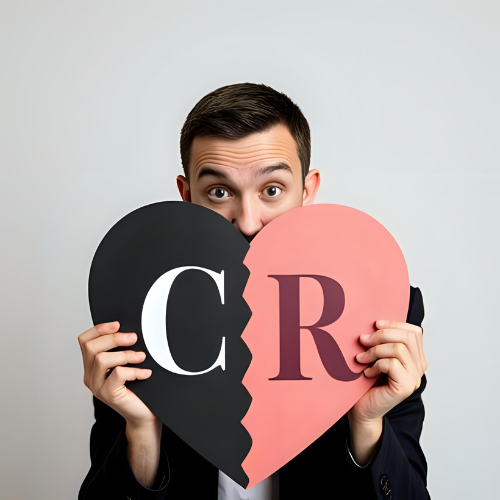Behind the Blog
The Chaos, The Humor, The Hope
Confessions of a Cynical Romantic: Navigating ADHD, OCD, and the Comedy of Life
How a Dash of Sarcasm (and a Lot of Self-Reflection) Turned My Diagnoses Into a Community—and a Lifeline
1. Humor as a Lifeline
Why did I launch Love, Lies & Scandals and invent the persona of the Cynical Romantic? The answer is simple: humor and a dash of irreverence have always been my life rafts in the choppy waters of the unknown.
When I was diagnosed with ADHD and OCD, I found myself facing a reality I barely understood—so I did what I do best. I leaned into laughter, distraction, and a healthy dose of sarcasm. For me, making light of heavy moments isn’t just a coping mechanism; it’s how I make sense of life’s bewildering turns.
Through this blog, I invite you into my journey—not as an expert, but as a fellow traveler searching for clarity, connection, and maybe a bit of comic relief along the way.
2. Finding Myself in the Diagnosis
Receiving those diagnoses felt like being handed a map with half the landmarks missing—confusing, daunting, and strangely liberating. I’d always thought ADHD and OCD were reserved for restless kids who eventually outgrew them, not adults juggling careers, families, and the minefield of daily responsibilities.
Once my misconceptions were shattered, I did what any modern seeker of truth does: I turned to social media. The digital world offered a mix of wisdom and wild speculation, where self-proclaimed experts shared everything from profound insights to theories that belonged in a Hollywood screenplay.
The more I scrolled, the more I realized understanding my own brain wouldn’t come from hashtags or memes. My therapist—patient, grounded, and occasionally amused—reminded me that real change would only come through reflection, education, and confronting uncomfortable truths. Slowly, I began to see that humor and self-inquiry weren’t just lifelines—they were guides.
That realization became the foundation for this blog: a place to process, connect, and uncover the stories behind the diagnosis.
3. The Long Road Toward Acceptance
Navigating treatment was anything but straightforward. I cycled through months of trial and error, tweaking medications and wrestling with the paradoxical dance of ADHD and OCD—two companions that seem to enjoy tripping each other up.
Denial became my default. After all, I’d managed for decades without pharmaceutical help, so why change now? But as I finally allowed myself to accept support, small shifts appeared: focus sharpened, the noise dulled, and the chaos quieted.
Accepting help didn’t mean surrendering my identity—it meant reclaiming control. For the first time, I began steering toward a life guided less by impulse and compulsion, and more by intention.
4. The Moment Everything Changed
Then came the reckoning.
Picture this: I’m driving, lost in thought, when the chaos in my mind finally swells to a breaking point. It’s like rubbernecking at a roadside accident—impossible to look away from the mess unfolding inside.
Years of denial and distraction couldn’t hold back the tide. I’d been through therapy, started CBT, collected coping tools—but it wasn’t until that full-blown meltdown in an empty parking lot that truth came crashing in.
I saw the patterns clearly: impulsive decisions, obsessive distractions, grand plans abandoned at the first obstacle. For years, I’d convinced myself I was on the verge of something great—regaling friends with big dreams, only to let them fade. The illusion of control shattered, leaving behind broken routines, neglected responsibilities, and loved ones quietly distancing themselves.
That moment forced me to stop spinning. To step off the carousel and face the uncomfortable truth: growth required more than humor—it demanded humility.
5. Learning to Listen
So I did what I’d been avoiding for years—I listened.
I listened to therapists, peers, and the countless voices online sharing their raw, unfiltered experiences. That parking-lot meltdown cracked something open. It became a moment of forced humility, pushing me to open up—not just to myself, but to others walking the same crooked path.
Each new insight made me a little more present, a little more patient, and a little better at pausing before the impulse or obsession took over.
6. Writing My Way to Connection
Change, I discovered, is exhausting. Forming new habits felt like learning a new language—one awkward syllable at a time. Books and podcasts offered plenty of advice, but the real breakthroughs came when I started writing about my relationships—not just with others, but with myself.
Through storytelling, I unraveled old narratives, examined how my quirks shaped friendships and love affairs, and found, hidden in the punchlines, something close to understanding. Humor became my compass again—helping me sift through guilt, regret, and the tender absurdity of being human.
As I chronicled my revelations, I realized sharing them wasn’t just therapeutic—it pulled me out of isolation and into community. Writing became a practice that brought focus, forgiveness, and connection—to myself, to loved ones, and to those who might see their reflection in my words.
7. Building a Life with Intention
Living with ADHD and OCD has often felt like navigating a labyrinth—each turn revealing both challenges and surprising camaraderie. Online, I found vibrant communities of people doing the same: carving lives marked by self-acceptance and growth.
Love, Lies & Scandals became my own lifeline—a space where reflection and routine coexist under the watchful eye (and occasional smirk) of the Cynical Romantic. Humor became not just a shield but a bridge—helping me face hard truths, understand my choices, and slowly break old patterns.
Through writing, I’m not just processing my past—I’m shaping my future. A future built on compassion, self-awareness, and connection.
8. An Invitation to Share the Journey
As I continue navigating the unpredictable terrain of ADHD, OCD, and love, humor remains both my compass and my companion. Sharing even the messiest parts of my story—with honesty and a wink—makes the weight easier to bear.
On my blog, the Do Better. Be Better. section dives into the practical side of managing symptoms and chasing self-improvement, while Love Gone Wrong explores the wild, often absurd drama of relationships that crash and burn.
I hope you’ll visit, read, and share your own stories. Whether you’re rolling your eyes at the Cynical Romantic or rooting for another chance at love, know this: none of us should have to figure it out alone.
Let’s navigate the chaos together—with curiosity, courage, and a healthy dose of laughter.





